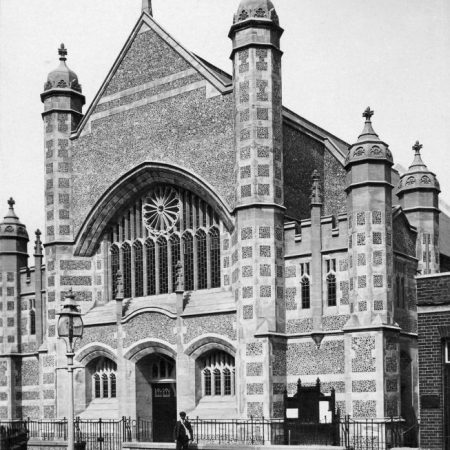1920 was a ‘red letter’ year for the Wesleyan Methodists of Basingstoke since it marked the golden jubilee of a permanent presence for their branch of Methodism in the town. A copy of a souvenir photograph to celebrate the event is lodged in the Hampshire Record Office (Wesleyan Methodist Ministers Past and Present and Leading Laymen 1920) and this, together with a detailed press report from the Hants and Berks Gazette, 3 April 1920, (A bound volume for 1920 is available at the Record Office Ref: 6M82/9 ), are the main sources for this short article.
The celebrations were held on Sunday and Monday 28 and 29 March and, as reported, ‘special efforts … (were) made to make the gatherings memorable.’ Described as ‘historic’:
An outstanding feature was the presence on the Monday of the Rev. William P. Ellis, the first Wesleyan Methodist minister appointed to Basingstoke in 1870. Mr Ellis who is in his 78th year is now living at Grove near Wantage. He is remarkably vigorous and active for his years, and he had the pleasure of meeting with a few friends who still live to remember him and his work in those distant days.
Other former ministers also attended and they were recorded for posterity, along with a number of leading laymen, in the previously mentioned photograph.
At the Sunday services which were ‘largely attended’, especially in the evening, the guest preacher was the Rev Simpson Johnson, an ex-President of the Wesleyan Conference. Johnson died unexpectedly in August 1920. In an obituary he was described as ‘an earnest and popular preacher … [whose] ministry was eminently Evangelical’ (Hull Daily Mail, 23 August 1920).
During the afternoon, what was described as a ‘young people’s demonstration’ was held. This was chaired by Edward Kynaston, who for many years had been the Sunday School superintendent. On Sunday evening, after the regular service, there was a special Jubilee musical service at 8.00. These had been held monthly for a number of years and proved to be very popular. Arranged by the organist, Duncan Hume, ‘the church was packed with an enthusiastic congregation, who greatly enjoyed the rich musical fare provided.’ On this occasion there were no solos, but a quartette “God is a Spirit” was ‘much appreciated by the audience’.
On Monday afternoon there was a thanksgiving service followed by a tea for between 250 and 300 persons with the rooms available being ‘pretty severely taxed.’ After tea the former ministers present offered ‘words of welcome to the ex-Service men’ who were attending the event. The Rev William Ellis then gave ‘an intensely interesting address describing his experiences and telling of some of the difficulties he had to encounter in the town fifty years ago, especially with regard to obtaining a site and erecting the first chapel.’ This had been moved to Cliddesden in the middle of the first decade of the twentieth century and replaced with a far grander and larger edifice (Wesleyan Methodist Church opened 1905).
The evening meeting was described as ‘inspiring and enthusiastic’ with reports on the financial situation and membership. A final effort was now being made to clear the outstanding debt on the new church of £1000. ‘Congregations had markedly increased and the collections had improved.’ The hope was that once the debt had been extinguished the church could single-mindedly engage in evangelism. As the Rev Johnson put it, he looked forward ‘to the days when there would be a great revival of religion.’
A number of past ministers then had their say. The Rev Samuel Oliver, having referred to the frosty reception John Wesley received in Basingstoke, claimed that ‘it was impossible to estimate the influence … [of] those who had been trained’ in the Church’s Sunday school. The Rev Harold Chapman beseeched ‘them to fulfil the purpose of this Church and make it an instrument for the salvation of their fellow men.’ This was followed up by the Rev Walter Barnes who asserted that if they meant business ‘the world would know and be impressed.’ The final contributor, the Rev Finlay Mackenzie, after recalling ‘the terrible years of the war’ sought to end on a high note by asserting that there was ‘hallelujah in all their hearts tonight.’ Fittingly, the proceedings ended with the singing of the “Hallelujah Chorus” from Handel’s “Messiah”.
All the quotations are from Hants and Berks Gazette, 3 April 1920 unless otherwise indicated.
Contributed by Roger Ottewill

